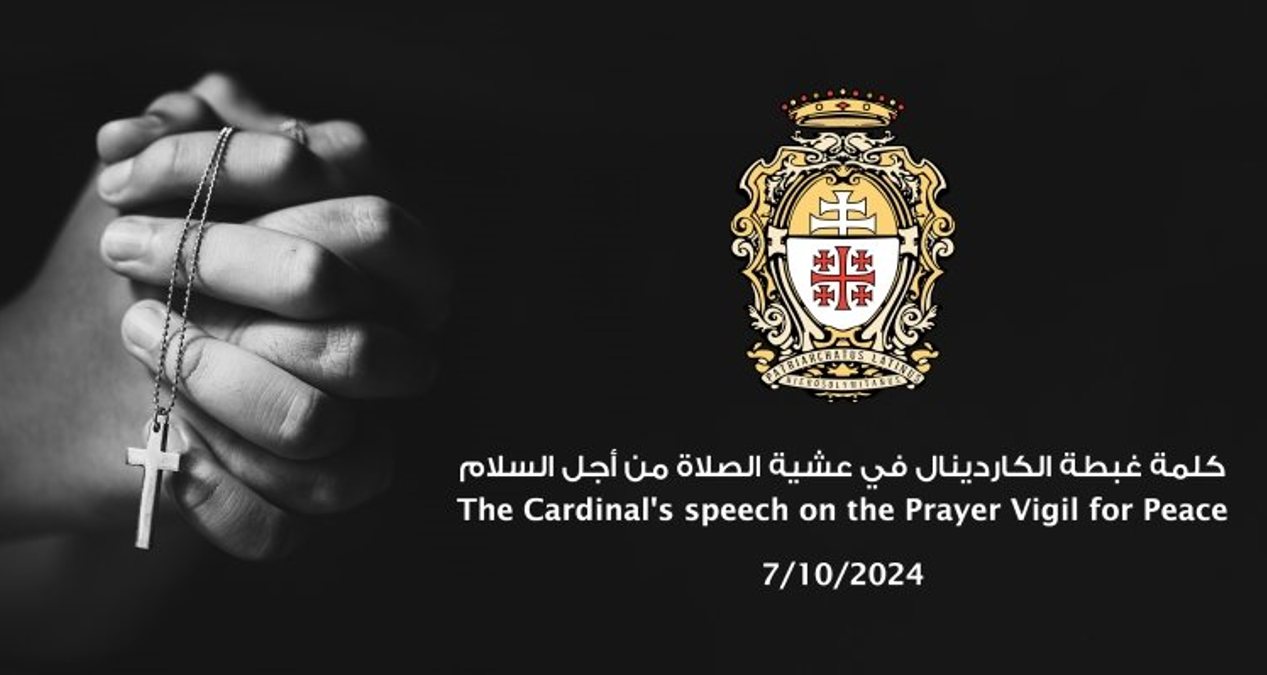Below you can find the Speech of His Beatitude Patriarch Cardinal Pierbattista Pizzaballa, Latin Patriarch of Jerusalem, on the Prayer Vigil for Peace, Monday 7 October 2024.
Ephesians 2:14-17
Dear brothers and sisters,
may the Lord give you peace!
We are gathered here at the end of a day of prayer, fasting and penance, at the end of one of the most difficult and painful years of recent times.
This year we have cried out our horror at the crimes committed, starting with the events of October 7 exactly one year ago, in southern [Israel], which have left a deep wound in [Israelis] to this day.
We raised our voice against the following turmoil of aggression, destruction, starving, suffering and death.
We are witnessing an unprecedented level of violence in words and actions. Hatred, grief and anger seem to have taken over our hearts, leaving no room for any other feelings but rejecting the other and their suffering.
During this year, we have expressed in every possible form our solidarity and support for our community in Gaza and all its inhabitants.
We have tried to be a voice strongly and clearly condemning all this violence that will only provoke a vicious circle of revenge, generating more violence.
We have reiterated our conviction that violence, aggression and wars, will never create peace and security.
We incessantly repeated that what we need instead is the courage to speak words that open horizons and not the other way around, to build the future instead of denying it. We need the courage to compromise, to give up to something, if necessary, for a greater good, that is peace. Never confuse peace with victory!
We have pointed to the need to build a common future for this land based on justice and dignity for all its inhabitants, starting with the Palestinian people, who can no longer wait for their right to independence, which has been postponed for far too long.
We have affirmed the need to do and say the truth in our relationships, to have the courage to speak words of justice and to open perspectives of peace.
What has happened and is happening in Gaza leaves us stunned and beyond understanding.
On one hand diplomacy, politics, multilateral institutions and the international community have shown all their weakness, on the other we have also been supported:
The Holy Father has repeatedly called on all parties involved to stop this drift, but he has also expressed human solidarity with our community in Gaza in concrete ways and has also given them concrete support.
Just today he sent a letter to all the Catholics of this region, expressing his closeness to all those who in various ways suffer the consequences of this war, especially to our brothers and sisters in Gaza, and encouraging us to become “witnesses to the power of a non-violent peace”, to be “sprouts of hope” and “testify to love amid words of hatred, to encounter amid growing confrontation, to unity amid increasing hostility”. Thank you, Holy Father!
We have received so many forms of solidarity from the entire Christian community with our Church. Human and Christian solidarity has found forms of expression of closeness that have been an important consolation for us. We have never been left alone with prayers, expressions of solidarity and even concrete help.
However, in such dramatic context, let us face it: this year has put our faith in a test. It is not easy to live in faith during these hard times.
The words ‘hope’, ‘peace’, ‘coexistence’, seem to us to be theoretical and far from reality. Perhaps even prayer, seemed to us to be a moral obligation to be fulfilled, but not the place from which we can draw strength in suffering, a different gaze on the world, not a space for privileged encounter with God, to find solace and comfort. I think these are unavoidable human thoughts.
But it is exactly here that our Christian faith must find a visible expression.
We are called to think beyond the logic calculations, we cannot stop only at human reflections that trap us in our grief, without opening perspectives. We are called to read these challenges in the light of the Word of God, a Word that accompanies and widen our hearts.
And we have to continue doing so.
Is not that our main mission as a church? That is, not only to be able to speak a word of truth about the present time, but also to see and show a world that goes beyond the present and its dynamics; to provide a language that can create a new world that is not yet visible, but is manifesting itself on the horizon? To propose a style of living in this conflict that already makes possible among us what we hope for in the future?
By LPJ






